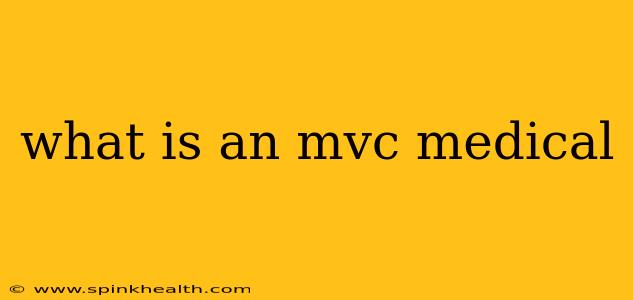What is an MVC Medical? Unraveling the Mystery of Motor Vehicle Collisions and Healthcare
The term "MVC medical" isn't a formally recognized medical term. Instead, it's a shorthand commonly used in medical and legal contexts to refer to medical issues arising from a motor vehicle collision (MVC), also known as a car accident. Think of it as a convenient label for a complex situation.
Imagine this: A car crash occurs. The impact leaves one or more individuals with injuries ranging from minor scrapes and bruises to severe, life-altering trauma. This is where "MVC medical" comes into play. It encompasses the entire spectrum of healthcare considerations resulting from the accident.
What kinds of injuries are treated under "MVC medical"?
This is a broad question, as the injuries sustained in a car accident are highly variable and depend on many factors, including the speed of the vehicles, the type of collision, whether safety features like airbags deployed, and the individuals' physical condition prior to the accident. However, some common injuries treated under the umbrella of "MVC medical" include:
-
Soft tissue injuries: These are often the most prevalent injuries in MVCs and can include whiplash (neck injury), strains, sprains, and contusions (bruises). Diagnosing these injuries can be challenging as they don't always show up on standard imaging tests like X-rays.
-
Fractures: Broken bones are a serious possibility, ranging from minor fractures to severe breaks requiring surgery. These can occur anywhere in the body, but are common in the limbs, spine, and ribs.
-
Head injuries: Head trauma, ranging from mild concussions to severe traumatic brain injuries (TBIs), is a major concern in MVCs. The consequences of head injuries can be devastating and long-lasting.
-
Internal injuries: Organ damage, internal bleeding, and other internal injuries can be life-threatening and often require immediate medical attention.
-
Psychological injuries: The emotional trauma associated with a car accident can be significant, leading to conditions such as post-traumatic stress disorder (PTSD), anxiety, and depression. These psychological effects are just as important as the physical injuries and require specialized treatment.
How is treatment for MVC medical injuries handled?
Treatment for injuries sustained in a motor vehicle collision is tailored to the specific injuries involved and can involve a wide range of medical professionals, including:
-
Emergency Medical Services (EMS): First responders at the scene provide initial stabilization and transport to the hospital.
-
Emergency Room Physicians: Initial assessment and treatment of life-threatening injuries.
-
Orthopedic Surgeons: Specialists in bone and joint injuries.
-
Neurologists: Specialists in nervous system injuries, including head injuries.
-
Physiatrists (Physical Medicine and Rehabilitation Physicians): Specialists in rehabilitation after injury.
-
Psychologists or Psychiatrists: For treating the psychological impact of the accident.
What are the long-term effects of MVC medical injuries?
The long-term effects of MVC injuries can vary greatly depending on the severity of the initial trauma. Some individuals may experience complete recovery, while others may live with chronic pain, disability, and other long-term complications. These long-term effects can have significant impacts on an individual's quality of life, employment, and social interactions. Ongoing rehabilitation and therapy are often crucial for managing these long-term effects.
What is the role of insurance in MVC medical treatment?
Insurance plays a crucial role in financing medical treatment after an MVC. Depending on the circumstances of the accident, different types of insurance may cover the costs of treatment, including health insurance, auto insurance, and possibly other types of liability insurance. Navigating insurance claims and coverage can be complex and often requires the assistance of legal professionals.
In summary, "MVC medical" is not a specific medical condition, but a descriptor for the wide array of health problems that can arise after a car accident. It highlights the multifaceted nature of care required, from emergency treatment to long-term rehabilitation and the significant role insurance plays in this process.

